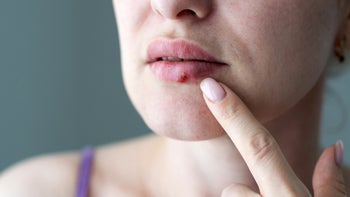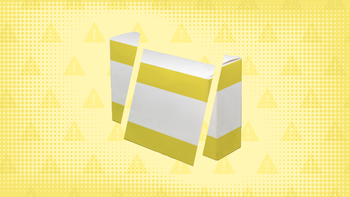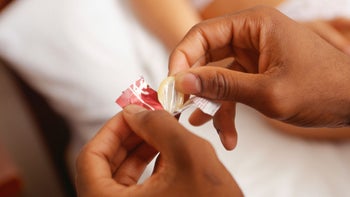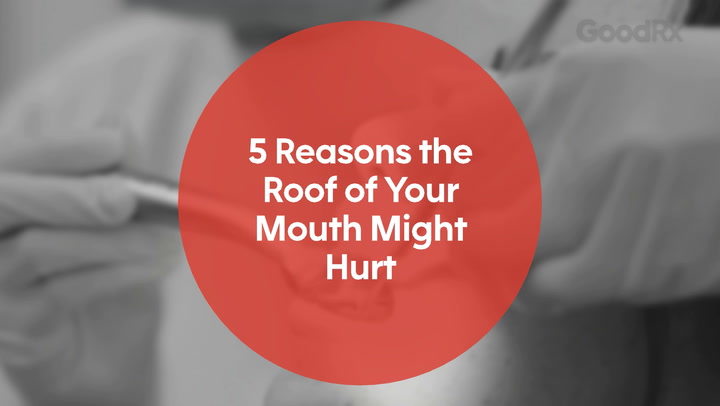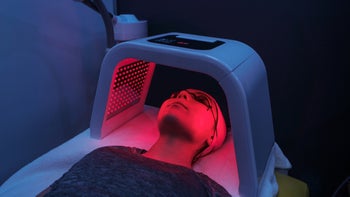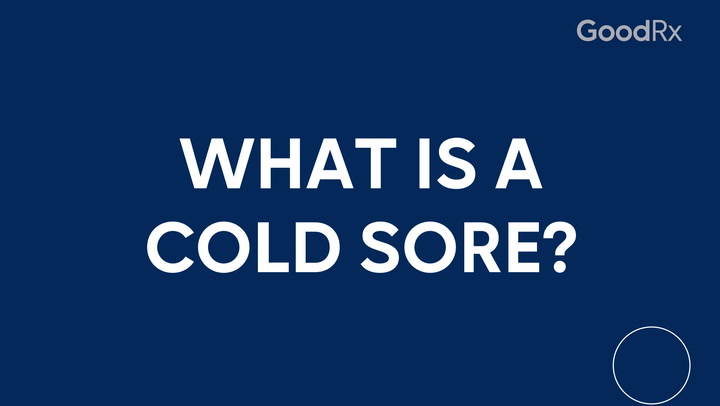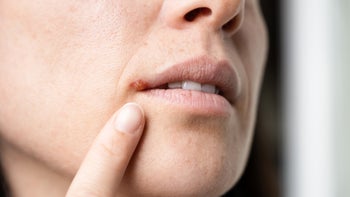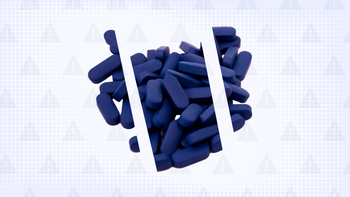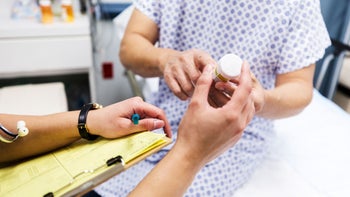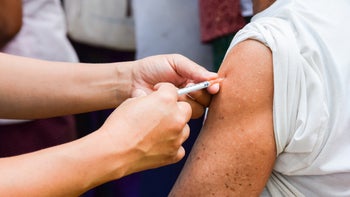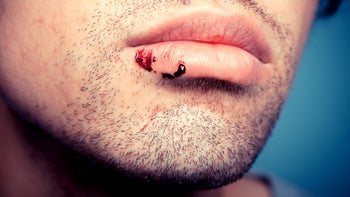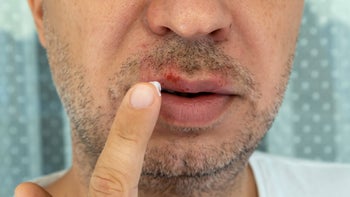
Tongue Herpes: What to Do About These Painful Blisters
Key takeaways:
The herpes simplex virus (HSV) causes painful blisters on the lips, mouth, or tongue.
Herpes on the tongue starts off as tongue redness that develops into a sore and then crusts over.
Herpes tongue blisters will go away on their own. But treatment can help them go away faster.
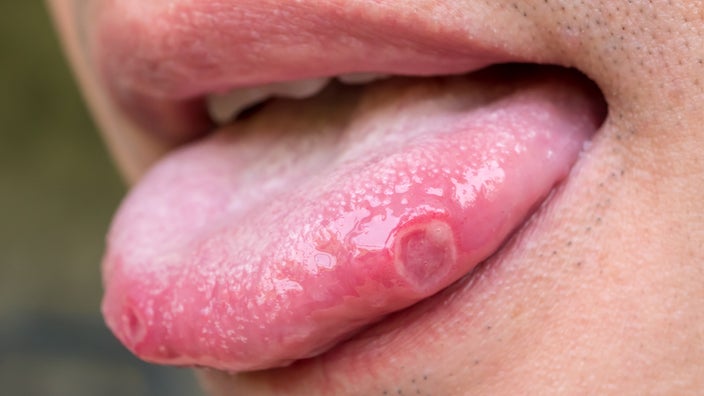
The herpes simplex virus (HSV) is a common virus that causes painful sores and blisters. There are two types of the virus: herpes simplex 1 (HSV-1) and herpes simplex 2 (HSV-2).
HSV-1 typically causes cold sores on the lips and sores or ulcers inside the mouth. HSV-2 usually causes painful sores on the genitals.
But both types can cause ulcers, sores, and blisters on the tongue. Herpes on the tongue is painful and makes it hard to eat and drink. But there are treatments that can help you feel better as your tongue heals.
Can you get herpes on your tongue?
Yes, you can get herpes on your tongue, just like you can get it on the inside of your mouth and on your lips. Additionally, tongue herpes can occur anywhere on the tongue. You can get a sore on the side of the tongue, the tip of the tongue, or the top or bottom of the tongue.
How do you get herpes in the mouth and on the tongue?
The herpes virus spreads by direct contact. You can pick up the virus by coming in contact with an ulcer or saliva and other bodily fluids that contain the virus. Here are several common ways for people to come in contact with the herpes virus and get herpes in the mouth:
Engaging in oral sex: If your partner has active herpes sores, you can get herpes on your tongue through unprotected oral sex.
Kissing: If someone has active herpes ulcers or cold sores on their lips or inside their mouth, you can get herpes on your tongue through kissing. Some people can also shed the virus in their saliva, even if they don’t have sores.
Sharing personal items: Saliva can have herpes virus in it. So if you share items that came in contact with someone’s saliva, you can also pick up the virus. Common culprits include items like lipstick, chapstick, utensils, and toothbrushes.
Is tongue herpes a sexually transmitted infection?
Tongue herpes isn’t always a sexually transmitted infection (STI). You can get herpes on your tongue through sexual activity. But you can also come in contact with herpes from nonsexual contact like sharing personal items or kissing.
What does herpes on the tongue look like?
Herpes on the tongue goes through several stages. The way it looks depends on the stage you are in:
First, parts of your tongue may look red. And you may experience slight tingling, burning, or itching.
Over a few days, these red spots turn into painful tongue sores. The sores can develop anywhere on your tongue, including under the tongue. Most people don’t develop bumps or blisters on their tongue.
Next, the sores turn a white color, get bigger, and become a painful ulcer. You might also notice ulcers on the roof of your mouth and on the inside of your cheeks.
In the last stage, the ulcers start to heal by crusting over. This can take anywhere between 4 and 6 days. Fortunately, the ulcers don’t usually scar as they heal. And, your tongue should go back to normal once the ulcers are gone.
In general, herpes on the tongue looks similar to herpes anywhere else on the lips or mouth. The biggest difference is that herpes tongue ulcers usually don’t scab over or develop blisters. Herpes on the tongue usually looks more like an open sore, often with a thin white coating.
How do you diagnose herpes on the tongue?
Most of the time, you can get a diagnosis of tongue herpes through a physical exam. You won’t usually need any further testing — your healthcare professional may make the diagnosis just by looking at your tongue.
It’s not always clear if a sore on the tongue is because of herpes. A canker sore can also look like herpes in some cases. Your healthcare professional might do extra tests to make sure the tongue sore is from herpes. They may rub a swab on your tongue ulcer and send it for herpes testing. They may also ask you to get a blood test to see if you have antibodies to the herpes virus.
How do you treat herpes on the tongue?
Tongue herpes will go away on its own in 7 to 10 days. But the ulcers and sores are painful and make it difficult to eat and drink. This can lead to dehydration, especially in young children.
If you have a lot of discomfort, talk with your primary care provider for your treatment options. These often include antiviral medications and pain-reducing medications.
Antiviral medications
Antiviral medications fight off the herpes virus. They’re only available by prescription. These medications work best when you start them early. So if you think you might have herpes in your mouth or on your tongue, it’s a good idea to get medical care for treatment. Common antiviral medications for herpes on the tongue include:
Valacyclovir (Valtrex)
Studies show that taking antiviral medications can lessen pain and speed up healing time.
Pain-reducing medications
Pain-reducing medications can help you feel more comfortable as you wait for your antiviral medications to work. Acetaminophen (Tylenol) and ibuprofen (Advil) are available over the counter (OTC) and offer excellent pain relief.
There are also OTC pain relievers that come in creams and gels. But they’re meant for cold sores on the lips, so you shouldn’t use them for herpes on the inside of your mouth or tongue.
Numbing medications are also available OTC and by prescription. These can provide temporary relief but aren’t always safe for everyone. It’s a good idea to talk with your primary care provider before using numbing medications as a treatment.
To help with pain relief for tongue herpes, you can also try cold liquids, ice chips, or popsicles.
How do you prevent tongue herpes?
Taking steps to avoid tongue herpes can save you a lot of pain down the road. Here are some ways you can avoid coming in contact with the herpes virus:
Always use condoms during sexual activity.
Don’t engage in sexual activity if your partner has active herpes sores.
Don’t share personal items that come in contact with another person’s mouth or saliva.
Avoid kissing anyone who has a cold sore.
The bottom line
The herpes virus causes painful ulcers on the lips, inside the mouth, and on the genitals. It can also cause ulcers on the tongue. Herpes on the tongue is painful and takes at least a week to go away. Prescription medication can help tongue herpes heal faster, but it works better if you start it early. If you think you have herpes on your tongue, see a healthcare professional to start treatment.
References
Arduino, P. G., et al. (2008). Herpes simplex virus type 1 infection: Overview on relevant clinico-pathological features. Journal of Oral Pathology & Medicine.
Cedars Sinai. (2022). Herpes simplex virus (HSV) mouth infection.
Centers for Disease Control and Prevention. (2022). Genital herpes.
Kłysik, K., et al. (2020). Acyclovir in the treatment of herpes viruses- A review. Current Medicinal Chemistry.
Spruance, S. L., et al. (1990). Treatment of recurrent herpes simplex labialis with oral acyclovir. The Journal of Infectious Diseases.
World Health Organization. (2023). Herpes simplex virus.




